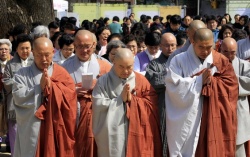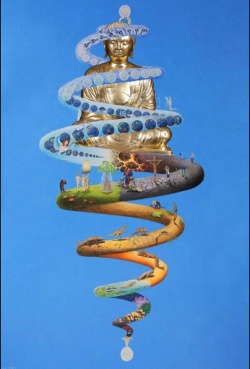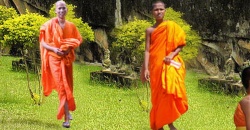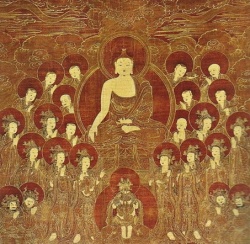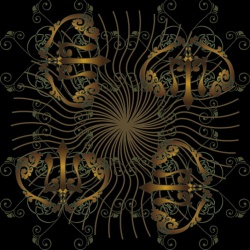Difference between revisions of "Drukpa Kunley"
(Created page with "Kunga Legpai Zangpo (1455 - 1529), was also known by other names such as Drukpa Kunley, Drukpa Kunleg (Tibetan: འབྲུག་པ་ཀན་ལེགས་, Wylie: 'brug ...") |
|||
| (17 intermediate revisions by 5 users not shown) | |||
| Line 1: | Line 1: | ||
| − | + | [[Image:Drukpa kunley.jpg|frame|'''[[Drukpa Kunley]]''' from a painting by [[Dugu Choegyal Rinpoche]])]<nomobile>{{DisplayImages|2213|1737|2063|2489|986|1631}}</nomobile> | |
| − | |||
| − | |||
| − | |||
| − | |||
| − | |||
| − | |||
| − | |||
| − | |||
| − | |||
| − | because I help them to go the path of enlightenment. | + | |
| + | |||
| + | |||
| + | |||
| + | [[Kunga Legpai Zangpo]] (1455 - 1529), was also known by other names such as [[Drukpa Kunley]], [[Drukpa Kunleg]] ([[Tibetan]]: {{BigTibetan|[[འབྲུག་པ་ཀན་ལེགས]]་}}, [[Wylie]]: [['brug pa kun legs]]), and "[[The Divine Madman of the Dragon Lineage]]" [[Kunga Legpa]] ([[Tibetan]]: {{BigTibetan|[[འབྲུག་སྨྱོན་ཀུན་དགའ་ལེགས་པ་]]}}, [[Wylie]]: [['brug smyon kun dgas pa]]). | ||
| + | |||
| + | He was a [[great master]] of [[Mahamudra]] in the [[Buddhist tradition]], as well as a famous poet. | ||
| + | |||
| + | |||
| + | |||
| + | =={{Wiki|Biography}}== | ||
| + | |||
| + | |||
| + | [[Drukpa Kunley]] was born into the branch of the [[noble]] [[Gya]] ([[Tibetan]]: {{BigTibetan|[[རྒྱ]]}}, [[Wylie]]: [[rgya]]) {{Wiki|clan}} of [[Ralung]] in the {{Wiki|Tsang}} region of [[western Tibet]], which was descended from [[Lhabum]] ([[lha 'bum]]), the second eldest brother of [[Tsangpa Gyare|Tsangpa Gyare Yeshe Dorje]]. | ||
| + | |||
| + | |||
| + | His father was [[Nang So Rin Chen Bzang Po]]. | ||
| + | |||
| + | |||
| + | He was the nephew of [[Gyalwang Kunga Paljor]]. | ||
| + | |||
| + | Father of [[Ngawang Tenzin]] and [[Zhingkyong Drukdra]]. | ||
| + | |||
| + | Established [[Chimi Lhakhang]] ([[khyii med lha khang]]), near [[Punakha]] ([[spung thang]]) in 1499. | ||
| + | |||
| + | He was known for his crazy [[methods]] of [[enlightening]] other [[beings]], mostly women, which earned him the title "The [[Saint of 5,000 Women]]". | ||
| + | |||
| + | Women would seek his [[blessing]] in the [[form]] of {{Wiki|sex}}. | ||
| + | |||
| + | |||
| + | However, the {{Wiki|female}} [[consort]] had/has an important (albeit secret) role in many [[monasteries]] in the {{Wiki|East}}. | ||
| + | |||
| + | [[Thangka]] paintings illustrate {{Wiki|sexual}} positions and some of the [[rituals]] that must accompany the [[actions]]. | ||
| + | |||
| + | Visitors to [[Drukpa Kunley's]] [[monastery]] in [[Bhutan]] are welcome, but the visit requires a long uphill walk from the road. The [[monastery]] is very modest, only one smallish building, but it contains a wood-and-ivory [[lingam]] through which one can obtain [[blessings]] from the [[monk]] in residence. | ||
| + | |||
| + | |||
| + | |||
| + | == [[Poems]] and songsof [[Drukpa Kunley]] == | ||
| + | |||
| + | |||
| + | |||
| + | '''Poem about [[happiness]]''' | ||
| + | |||
| + | I am [[happy]] that I am a free [[Yogi]]. | ||
| + | |||
| + | So I grow more and more into my inner [[happiness]]. | ||
| + | |||
| + | I can have {{Wiki|sex}} with many women, | ||
| + | |||
| + | because I help them to go the [[path]] of [[enlightenment]]. | ||
Outwardly I'm a fool | Outwardly I'm a fool | ||
| − | and inwardly I live with a clear spiritual system. | + | and inwardly I [[live]] with a clear [[spiritual]] system. |
Outwardly, I enjoy wine, women and song. | Outwardly, I enjoy wine, women and song. | ||
| − | And inwardly I work for the benefit of all beings. | + | And inwardly I work for the {{Wiki|benefit}} of all [[beings]]. |
| + | |||
| + | Outwardly, I [[live]] for my [[pleasure]] | ||
| + | |||
| + | and inwardly I do everything in the right [[moment]]. | ||
| + | |||
| + | Outwardly I am a ragged {{Wiki|beggar}} | ||
| − | + | and inwardly a [[blissful]] [[Buddha]]. | |
| − | + | '''Song about the [[pleasure]]''' | |
| − | + | A young woman finds [[pleasure]] in [[love]].<br/> | |
| + | A young man finds [[pleasure]] in {{Wiki|sex}}.<br/> | ||
| + | An old man finds [[pleasure]] in his memoirs.<br/> | ||
| + | This is the [[doctrine]] of the three [[pleasures]].<br/> | ||
| − | + | Who does not know the [[truth]], is confused.<br/> | |
| + | Those who have no goals, can not {{Wiki|sacrifice}}.<br/> | ||
| + | Those who have no [[courage]], can not be a [[Yogi]].<br/> | ||
| + | This is the [[doctrine]] of the three missing things.<br/> | ||
| − | + | Even if a [[person]] [[knows]] the way of [[wisdom]];<br/> | |
| + | without practicing there is no [[realization]].<br/> | ||
| + | Even if a [[master]] shows you the way,<br/> | ||
| + | you have to go it by yourself.<br/> | ||
| − | + | '''The five [[spiritual]] ways''' | |
| − | |||
| − | |||
| − | |||
| − | + | I practice the [[path]] of [[self-discipline]].<br/> | |
| − | + | I [[meditate]] every day. | |
| − | |||
| − | |||
| − | + | I go the way of embracing [[love]].<br/> | |
| − | + | I work as a mother and father of all [[beings]]. | |
| − | |||
| − | |||
| − | + | I do the [[deity yoga]].<br/> | |
| + | I [[visualize]] myself as a [[Buddha]] in the [[cosmic]] {{Wiki|unity}}. | ||
| − | I | + | I read the [[books]] of all [[religions]]<br/> |
| − | + | and practice all at the right [[moment]]. | |
| − | + | The [[life]] is my [[teacher]]<br/> | |
| − | + | and my inner [[wisdom]] is my guide. | |
| − | + | ==Main [[teachers]]== | |
| − | + | * [[Gyalwang Drukpa]] II, [[Gyalwang Kunga Paljor]] ([['brug chen kun dgal 'byor]]) 1428-1476 | |
| + | * [[Lhatsun Kunga Chökyi Gyatso]] ([[lha btsun kun dgas kyi rgya mtsho]]) 1432-1505 | ||
| + | * [[Pema Lingpa]] ([[padma gling pa]]) 1445-1521 | ||
| − | |||
| − | |||
| − | + | ==Main [[lineages]]== | |
| − | |||
| − | |||
| − | |||
| − | |||
| − | |||
| − | |||
*[[Drukpa Kagyu]] | *[[Drukpa Kagyu]] | ||
| + | |||
==Alternate names== | ==Alternate names== | ||
| − | |||
| − | + | * [[Drukpa Kunleg]] / [[Drukpa Kuenle]] | |
| − | [[ | + | |
| + | {{W}} | ||
| + | |||
| + | {{NewSourceBreak}} | ||
| − | [[Category:Tibetan Buddhist | + | '''[[Drukpa Kunley]]''' ([[Wyl.]] '' [['brug pa kun legs]]'') or '''[[Kunga Lekpa]]''' (1455-1529) was an {{Wiki|eccentric}} [[master]] of the '[[crazy yogi]]' or '[[divine madman]]' type, whose [[enlightened]] [[deeds]] and exploits, often involving women and [[alcohol]], are commonly recounted even to this day among [[Tibetans]] and [[Bhutanese]] [[people]]. |
| + | |||
| + | |||
| + | ==Further Reading== | ||
| + | |||
| + | *[[Keith Dowman]], ''[[Divine Madman]]: The [[Sublime]] [[Life]] and Songs of [[Drukpa Kunley]]'', Dawn [[Horse]] Press, 1982 | ||
| + | }} | ||
| + | |||
| + | ==External Links== | ||
| + | |||
| + | *[http://www.tbrc.org/link?RID=P816 TBRC Profile] | ||
| + | {{RigpaWiki}} | ||
| + | |||
| + | [[Category:Bhutan]] | ||
| + | [[Category:Tibetan Buddhist Teachers]] | ||
[[Category:Drukpa Kagyu lamas]] | [[Category:Drukpa Kagyu lamas]] | ||
[[Category:Bhutanese lamas]] | [[Category:Bhutanese lamas]] | ||
| − | |||
| − | |||
Latest revision as of 17:57, 24 July 2024
[[Image:Drukpa kunley.jpg|frame|Drukpa Kunley from a painting by Dugu Choegyal Rinpoche)]
Kunga Legpai Zangpo (1455 - 1529), was also known by other names such as Drukpa Kunley, Drukpa Kunleg (Tibetan: འབྲུག་པ་ཀན་ལེགས་, Wylie: 'brug pa kun legs), and "The Divine Madman of the Dragon Lineage" Kunga Legpa (Tibetan: འབྲུག་སྨྱོན་ཀུན་དགའ་ལེགས་པ་, Wylie: 'brug smyon kun dgas pa).
He was a great master of Mahamudra in the Buddhist tradition, as well as a famous poet.
Biography
Drukpa Kunley was born into the branch of the noble Gya (Tibetan: རྒྱ, Wylie: rgya) clan of Ralung in the Tsang region of western Tibet, which was descended from Lhabum (lha 'bum), the second eldest brother of Tsangpa Gyare Yeshe Dorje.
His father was Nang So Rin Chen Bzang Po.
He was the nephew of Gyalwang Kunga Paljor.
Father of Ngawang Tenzin and Zhingkyong Drukdra.
Established Chimi Lhakhang (khyii med lha khang), near Punakha (spung thang) in 1499.
He was known for his crazy methods of enlightening other beings, mostly women, which earned him the title "The Saint of 5,000 Women".
Women would seek his blessing in the form of sex.
However, the female consort had/has an important (albeit secret) role in many monasteries in the East.
Thangka paintings illustrate sexual positions and some of the rituals that must accompany the actions.
Visitors to Drukpa Kunley's monastery in Bhutan are welcome, but the visit requires a long uphill walk from the road. The monastery is very modest, only one smallish building, but it contains a wood-and-ivory lingam through which one can obtain blessings from the monk in residence.
Poems and songsof Drukpa Kunley
Poem about happiness
I am happy that I am a free Yogi.
So I grow more and more into my inner happiness.
I can have sex with many women,
because I help them to go the path of enlightenment.
Outwardly I'm a fool
and inwardly I live with a clear spiritual system.
Outwardly, I enjoy wine, women and song.
And inwardly I work for the benefit of all beings.
Outwardly, I live for my pleasure
and inwardly I do everything in the right moment.
Outwardly I am a ragged beggar
and inwardly a blissful Buddha.
Song about the pleasure
A young woman finds pleasure in love.
A young man finds pleasure in sex.
An old man finds pleasure in his memoirs.
This is the doctrine of the three pleasures.
Who does not know the truth, is confused.
Those who have no goals, can not sacrifice.
Those who have no courage, can not be a Yogi.
This is the doctrine of the three missing things.
Even if a person knows the way of wisdom;
without practicing there is no realization.
Even if a master shows you the way,
you have to go it by yourself.
The five spiritual ways
I practice the path of self-discipline.
I meditate every day.
I go the way of embracing love.
I work as a mother and father of all beings.
I do the deity yoga.
I visualize myself as a Buddha in the cosmic unity.
I read the books of all religions
and practice all at the right moment.
The life is my teacher
and my inner wisdom is my guide.
Main teachers
- Gyalwang Drukpa II, Gyalwang Kunga Paljor ('brug chen kun dgal 'byor) 1428-1476
- Lhatsun Kunga Chökyi Gyatso (lha btsun kun dgas kyi rgya mtsho) 1432-1505
- Pema Lingpa (padma gling pa) 1445-1521
Main lineages
Alternate names
Source
Drukpa Kunley (Wyl. 'brug pa kun legs) or Kunga Lekpa (1455-1529) was an eccentric master of the 'crazy yogi' or 'divine madman' type, whose enlightened deeds and exploits, often involving women and alcohol, are commonly recounted even to this day among Tibetans and Bhutanese people.
Further Reading
- Keith Dowman, Divine Madman: The Sublime Life and Songs of Drukpa Kunley, Dawn Horse Press, 1982
}}
